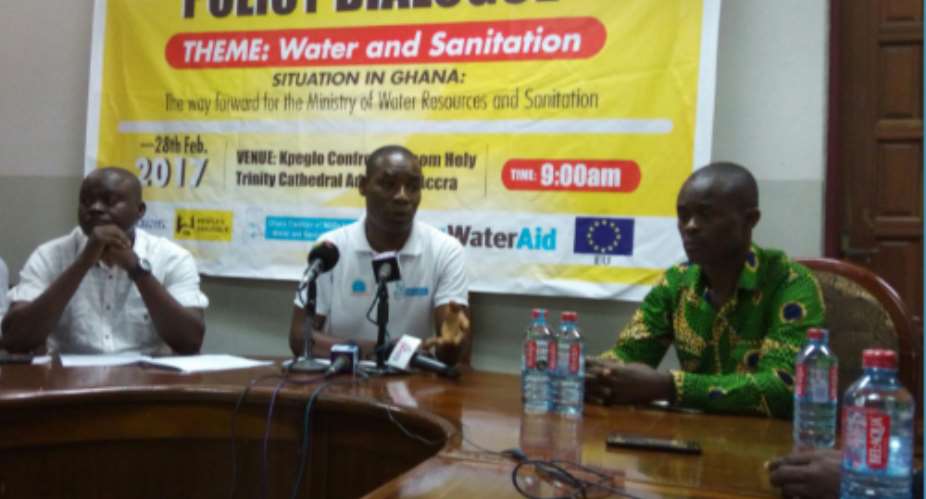Coalition of NGO’s In Water And Sanitation (CONIWAS) is calling on the current administration to pay particular attention to financing household toilet facilities by establishing a fund at the District Assembly.
Speaking at a news conference in Accra, the Spokesperson Civil Society Organization and Community Group in Water, Sanitation and Hygiene, Lartey Benjamin said government should dedicate portions of the District Assembly Common Fund to Sanitation Fund to assist community members to set up toilet facilities in their homes.
According to him, more that 5million people practice open defecation due to lack of decent toilets at home with Ghana being ranked as second to Sudan.
Ghana has been ranked as second in Africa in open defecation with 19 per cent of its population resorting to sanitation practice deemed the riskiest of all, a United Nations International Children’s Emergency Fund (UNICEF) report.
Mr. Benjamin added that surveys by a few projects indicate that more than 80% of households in low income communities have indicated that they need financial support – soft loans, grants etc, to enable them to install toilets at home.
He expressed worry that there is currently no clear funding mechanism for household toilets adding that in 2010, the government made a commitment to invest at least U$200 million annually in water and sanitation and a further U$150 million per annum towards hygienic treatment and disposal of septage and faecal sludge as well as sullage and storm-water management.
The Spokesperson added that government also made a commitment to make further allocations up to the minimum threshold of 0.5% of GDP to cover capacity building for hygiene education including proper hand-washing methods, country-wide outreach of Community-led Total Sanitation (CLTS) and general enhancement of enabling elements.
He posited that these commitments made to the Sanitation and Water for ALL (SWA) Global Partnership in 2010 have not yet been honoured.
Owing to the fact that the requirement in the National Environmental Sanitation Strategy and Action Plan to set up a Sanitation Fund has also not been implemented.
Stressing on technology, Mr. Benjamin emphasised that there is no clear national programme to promote solid waste separation, treatment and reuse.
“The most common practice has been dumping of all sorts of waste at landfill sites, which are also becoming more difficult to find in recent years. As part of the government’s resolve to partner with the private sector to develop some other sectors, we expects the government and the new ministry to extend a similar drive to the solid waste management industry, whereby waste will be sorted, treated and re-used,” he intimated.
The Spokesperson indicated that government can launch a campaign to that effect and provide the enabling environment for private investors in waste management so that their interest could be sustained.
According to him, a 2014 Ghana Living Standards Survey indicates that more than 62% of households in Ghana drink water from sources contaminated with faecal matter and that people in rural areas are more than two times more likely to be affected than those in urban communities.
He said the priority technology for rural water supply in Ghana is the borehole since it is the most affordable option.
Mr. Benjamin however noted that more than 50% of rural households depend on wells, and well water is the most affected in terms of quality.
The Spokesperson indicated that lack of enforcement of the law has slow down or even prevent effective implementation of most initiatives in sanitation and water.
He urged the Ministry to therefore work to remove all obstacles that make enforcement of bye-laws difficult.
According to him, the sanitation and water sector is very weak in terms of documentation and information management. The sector lacks a central repository for critical information required for effective decision-making.
He added that information management systems, at the moment, are fragmented between various agencies and there is no central reporting mechanism.
Mr. Benjamin urged the Ministry to establish a central mechanism to harmonize all existing information management systems, coordinate sector research and produce periodic sector performance reports against the SDG indicators and targets.
He concluded that CONIWAS would be glad to learn that the new Sanitation and Water Resources Ministry is working to tackle the root causes of the challenges facing the sanitation and water sector – non-prioritization which underlies the perennial under-resourcing of the sector, non-enforcement of laws as a result of weak institutional capacities, weak research into modern technology options, and poor documentation and information management.





 Togo leader Gnassingbe follows father's political playbook
Togo leader Gnassingbe follows father's political playbook
 NDC panics over Bawumia’s visit to Pope Francis
NDC panics over Bawumia’s visit to Pope Francis
 EC blasts Mahama over “false” claims on recruitment of Returning Officers
EC blasts Mahama over “false” claims on recruitment of Returning Officers
 Lands Minister gives ultimatum to Future Global Resources to revamp Prestea/Bogo...
Lands Minister gives ultimatum to Future Global Resources to revamp Prestea/Bogo...
 Wa Naa appeals to Akufo-Addo to audit state lands in Wa
Wa Naa appeals to Akufo-Addo to audit state lands in Wa
 Prof Opoku-Agyemang misunderstood Bawumia’s ‘driver mate’ analogy – Miracles Abo...
Prof Opoku-Agyemang misunderstood Bawumia’s ‘driver mate’ analogy – Miracles Abo...
 EU confident Ghana will not sign Anti-LGBTQI Bill
EU confident Ghana will not sign Anti-LGBTQI Bill
 Suspend implementation of Planting for Food and Jobs for 2024 - Stakeholders
Suspend implementation of Planting for Food and Jobs for 2024 - Stakeholders
 Tema West Municipal Assembly gets Ghana's First Female Aircraft Marshaller as ne...
Tema West Municipal Assembly gets Ghana's First Female Aircraft Marshaller as ne...
 Dumsor is affecting us double, release timetable – Disability Federation to ECG
Dumsor is affecting us double, release timetable – Disability Federation to ECG
